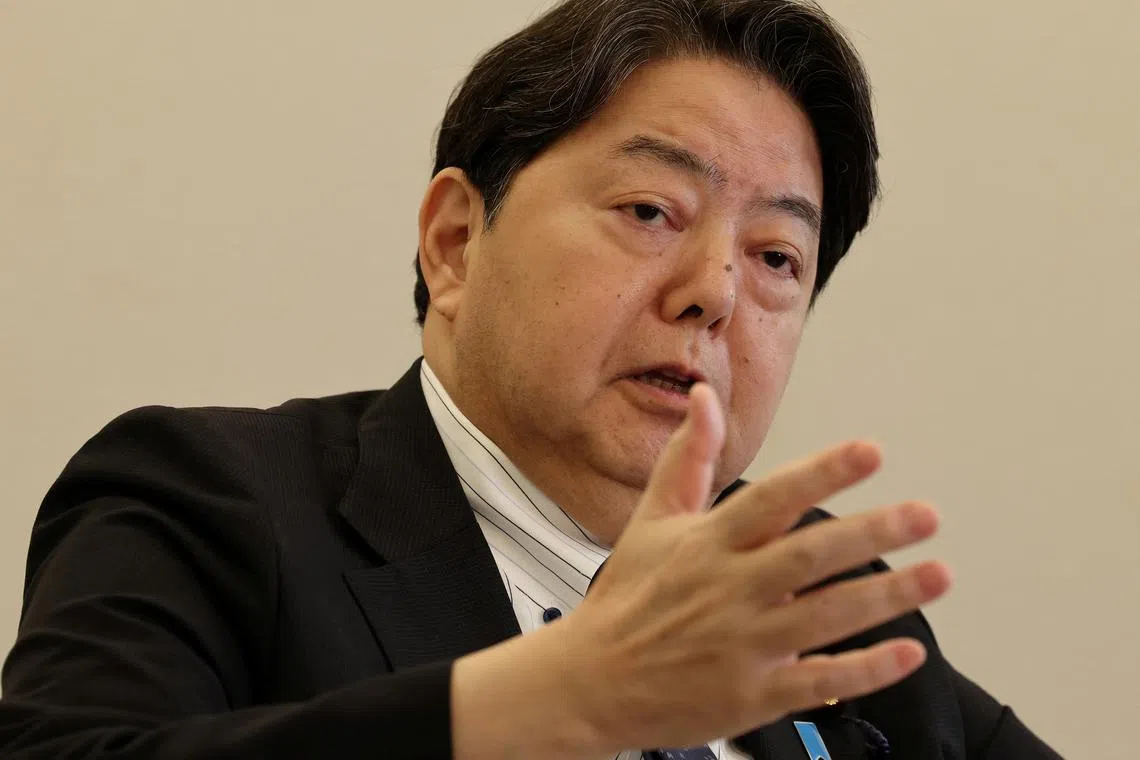Japan says Chinese aircraft incursion a ‘serious violation’
Sign up now: Get insights on Asia's fast-moving developments

Japan's Chief Cabinet Secretary Yoshimasa Hayashi said China's military aircraft at its airspace is totally unacceptable.
PHOTO: REUTERS
TOKYO - Japan on Aug 27 slammed what it called the first confirmed incursion by a Chinese military aircraft into its airspace as a “serious violation” of its sovereignty, saying Beijing was becoming “increasingly active”.
China’s growing economic and military clout in the Asia-Pacific region and its assertiveness in territorial disputes – most recently with the Philippines – has rattled the United States and its allies, and the Aug 26 incident represents a further heightening of tensions.
Tokyo, Washington’s closest ally in the region, said it scrambled fighter jets after the two-minute incursion
The Chinese Foreign Ministry said on Aug 27 that relevant departments in China were still trying to understand the situation.
“The two sides have maintained communication through existing working channels,” Mr Lin Jian, a ministry spokesman, said at a news briefing.
“I’d also like to emphasise that China has no intention of invading the airspace of any country,” he said.
US National Security Adviser Jake Sullivan was due in Beijing later on Aug 27 for talks with top diplomat Wang Yi that will include the South China Sea.
Analysts said China was possibly probing Japan’s air defence network, seeking to obtain intelligence and putting pressure on Tokyo as it expands defence cooperation with the United States and other countries in the region alarmed by Beijing’s behaviour.
“The violation of our airspace by Chinese military aircraft is not only a serious violation of our sovereignty but also a threat to our security, and is totally unacceptable,” Japan’s chief government spokesman Yoshimasa Hayashi told reporters.
“We refrain from giving a definite answer as to the intended purpose of the Chinese aircraft’s action. However, China’s recent military activities near Japan have a tendency to expand and become increasingly active,” he told a regular briefing.
The uninhabited Danjo Islands are a group of small islets located in the East China Sea off Japan’s southern Nagasaki region, and are not disputed territory.
Japanese and Chinese vessels have been involved in tense incidents in other areas, in particular the remote Senkaku islands in the East China Sea claimed by Beijing, which calls them the Diaoyus.
Tokyo has reported the presence of Chinese coast guard vessels, a naval ship and even a nuclear-powered submarine in the area, and there have been a series of confrontations between Japanese coast guard vessels and Chinese fishing boats.
Two non-military aircraft from China – a propeller-powered plane and a small drone – forayed into airspace near the Senkaku islands in 2012 and 2017, according to Japanese broadcaster NHK.
‘Counter-strike’
Japan, staunchly pacifist for decades, has ramped up defence spending with US encouragement, moving to acquire counter-strike capabilities and easing rules on arms exports.
Tokyo is also providing countries across the region with funding and equipment such as patrol vessels, and agreed in July on a deal with the Philippines
Manila and Beijing have been involved in a series of confrontations, most recently in waters near the disputed Sabina Shoal
Beijing claims the South China Sea – through which trillions of dollars of trade passes each year – almost in its entirety, despite an international court ruling that its assertion has no legal basis.
China deploys boats to patrol the busy South China Sea, and has built artificial islands that it has militarised to reinforce its claims.
Professor Heng Yee Kuang from the University of Tokyo said that the Y-9 in Aug 26’s incident “was likely probing Japan’s air defence network, collecting electronic intel such as Japan’s radar signals and coverage”.
Dr Naoko Aoki, a political scientist at the Rand think-tank, said that China may be seeking “to pressure Japan as Japan continues to try to both hedge against and engage with China to balance its security concerns with economic interests”.
“The area this happened in could be of significance. China claims control over a large area of the continental shelf in the East China Sea, and China may be making a point, challenging Japan’s delineation method,” she said. AFP, REUTERS


